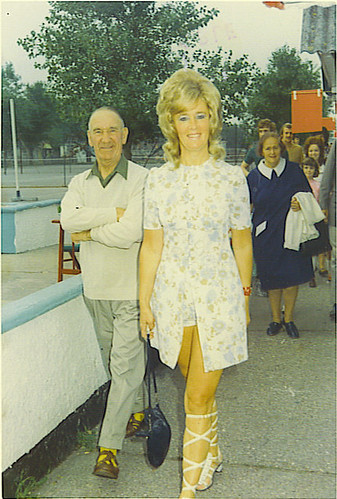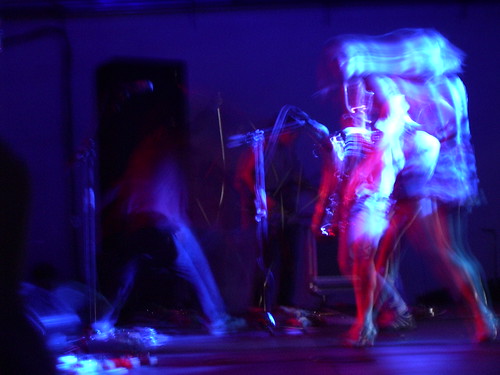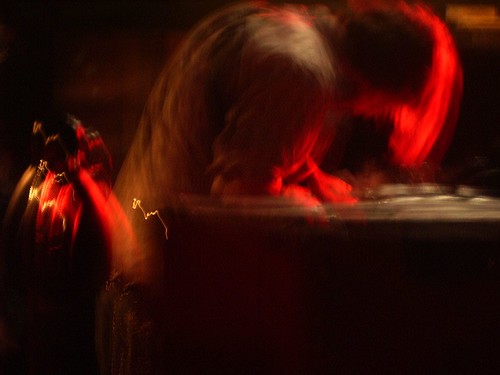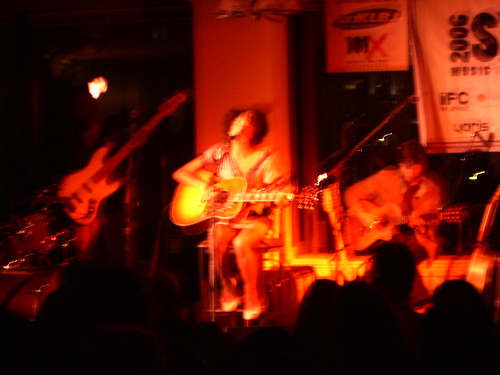An arctic January afternoon in
“I knew we had a photo shoot today, so I went shopping,” he grins, emptying the contents of the bags – navy cardigans and sweaters, an off-white knit jersey, in keeping with his generally dressed-down style – onto a nearby table in Krenkel’s front room. In person, traces of stubble and the odd laughter-line temper the fresh-faced boyishness Oberst radiates in his most recent press shots. Dyed black hair, parted in the centre, hangs down to just above his shoulders, framing his arresting, and oft-commented-upon, lime-green eyes. He talks gently, moves slowly, a little awkwardly, his head and hands seemingly too large for his slight body, like he’s still in the middle of a growth spurt, in that awkward space between adolescence and adulthood. Fittingly, that’s also the position Oberst occupies in American music right now, the one-time teen pin-up of sensitive music fans besotted with his Salinger-esque tales of misadventure and regret, who, in recent years, has set about establishing himself as a perceptive and impassioned political song-writer.
He has toured alongside Springsteen and REM in support of the Democrat party, while 2005’s anti-Bush salvo, When The President Talks To God, saw him canonised by the press as “the next Dylan” (a status he bashfully acknowledges today as “flattering, but ridiculous”). However, despite being hailed as the saviour of American political songwriting, Conor Oberst says he is still able to a life of quiet anonymity in
Or maybe Oberst has just adjusted to living his life in the public eye. After all, having performed onstage since he was twelve, and recording searing, disarmingly intimate albums since he was thirteen, twenty-seven year old Oberst has done much of his growing up in public. Since his breakthrough, with 2002’s *Lifted, the media have documented every step and mis-step, from a brief dalliance with Winona Ryder in 2003 to his occasional, infamous chemically-enhanced onstage performances.
While Oberst excuses himself and pops into Krenkel’s bedroom to pose for MOJO’s photoshoot, Krenkel slips a freshly-mastered CD of *Cassadaga, Bright Eyes’ new album, onto his stereo system, volume turned as loud as his no-doubt-wealthy neighbours will allow.
Oberst’s earlier recordings – and there are many – could often be messily emotional, wilful things, his voice breaking across songs that read like (and sometimes were) cathartic diary entries. *Cassadaga is a different beast. The album takes its name from a Floridian Spiritualist community Oberst visited last year where he received readings from the local Wiccans. The singer admits to an enduring curiosity with spirituality, born out of his regular thoughts upon mortality (which first surfaced in his songwriting with ‘Padraic My Prince’, describing the death-by-drowning of a fictional brother).
Pedal steel, violins and warm, buzzing guitars dominate, opener Four Winds recalling the bucolic bonhomie of The Band, and suggesting a new-found maturity in his sound. The lyrics essay love, religion, death in a most distinctive, contemplative voice, painting an
“I’d like to think that I’ve gotten a little more nuanced,” Oberst agrees later, reclining on a vintage chaise-longue in Krenkel’s similarly book-lined bedroom. “When I first started, there was no audience, there were no expectations. When you’re 17 years old, it feels pretty good to scream into a tape recorder. That’s how it went, for a long time, until this gradual realisation that I don’t necessarily like how that sounds, just letting it all out. Maybe it would be better if it was a little more subtle, more refined.
“Cassadaga’s much more of a ‘complete idea’,” insists Oberst. He spent a year working on the album, recording in
While he treasures the musician’s peripatetic lifestyle,
Conor first visited
Though he’d travelled the world with Bright Eyes, until 2003 Oberst had only ever lived in
Having formerly handled Oberst’s publishing, Krenkel assumed managerial responsibilities for Bright Eyes. Together, he and Oberst formed their Team Love record label, now home to Willy Mason, Tilly & The Wall, Minnesotan singer-songwriter David Dondero and former Shudder To Think frontman Craig Wedren. Soon, Oberst found an apartment of his own, nearby. He’s reluctant, however, to describe himself as a New Yorker – a certain restlessness persists. “I still really like it here, but I’ve realised in the last year or so, I’m not one of those people who wants to be a ‘New Yorker’ for life. Sometimes, I really need space.
“I have a sort of ‘grass is always greener’ mentality,” he smiles. “The most peaceful place for me is in-between cities: you’ve got your friends, you’ve got your band, and you’re out there, suspended from the world. It’s an escape. Being a musician, being able to spend a year isolated, recording music, and then spend the next year travelling the world, playing it for people, is really good for my well-being.”
Conor Oberst’s political awakening came with the American Presidential Election of 2000, which saw George W. Bush awarded a keenly-contested presidency over his Democrat opponent, outgoing Vice President Al Gore.
“When I was a teenager, politics weren’t even within my realm of reality,” Oberst remembers, “But in 2000, I remember reading some of his statements and thinking ‘Wow, I hope this young Bush doesn’t get in!’ We were touring in
In early 2001, Oberst formed Desaparecidos, with local
The group had just finished recording their album when the attacks of September 11th happened. “I had this sick feeling in my stomach,” remembers Oberst. “I felt, Can we release this record now? It was a fragile time, everybody was freaked out. I was too. But the most American thing you can do is to speak your mind. Freedom of speech, freedom of expression, these are the things I love about democracy, about
As the build-up to war progressed, Oberst became a self-confessed ‘news-junkie’, poring over the daily papers and watching hours of cable news broadcasts. Politics bled into the lyrics of 2002’s Lifted, and the two albums he released simultaneously in early 2005, the yearning, acoustic-based I’m Wide Awake, It’s Morning (featuring Emmylou Harris’s unmistakeable harmonies on three tracks), and its dark, electronic twin, Digital Ash In A Digital Urn, an album Conor described as “dealing with the fear of death, and trying to move past that.” A vegan, he voiced his support for PETA, and boycotted the Clear Channel network of music venues in protest of their corporate policies. And in October 2004, at Michael Stipe’s personal request, he toured
“That whole experience was real empowering; participating in the political system, representing my beliefs in the public forum,” he remembers. “I’ve been so lucky to get to meet and play with REM, and Springsteen, and Neil Young. They’re all musical idols, but the way they conduct their business, the way they are as human beings, is inspiring. It gives me hope – I could last that long, and maybe never be that great musically, but be that intelligent, that compassionate.
“And then, the election.” He sighs darkly. “I was convinced Bush couldn’t win. I was sure of it. And when it happened… Total devastation. It was probably the worst I’ve ever felt. We straight away went to
On a stormy ferry trip from
“When I played it that night in
Oberst’s political awakening doesn’t mean he’s above making a drunken fool of himself and getting into trouble. No, if a man ever truly learns from his mistakes, Conor has gleaned plenty of painful wisdom from the last few years. He shifts uncomfortably in the chaise-longue as he recalls his misadventures at the
“I regret it,” he sighs, sincerely. “It’s the exact opposite of how I really feel. There’s a record store in
“I was just out-of-my-mind,” he frowns, fidgeting like a naughty little boy in the headmaster’s office. “We were winding down towards the end of a year on the road, partying. We’d just flown in from
He says that when Bright Eyes take to the road again, later this year, they will be “A little smarter, not kill ourselves. Getting ‘fucked up’ is such a part of rock’n’roll, because it becomes all you can do. When people say, ‘I’m gonna party like a rock’n’roll star!’, they don’t understand that rock’n’roll stars get fucked up because they’re far away from home, dealing with peoples’ expectations of them, and sick half the time. It might look romantic from the outside, but it really isn’t. It’s an occupational hazard, a negative side-effect of what we do. You just have to grow up and deal with it better, watch out for yourself and your friends, try and keep everyone healthy in both body and mind. We’re learning along the way.”
With maturity often comes a bitter exchange, of innocence for wisdom. You’ll find that wisdom scattered across Oberst’s lyrics, sharing lessons learned, detailing his failings and foul-ups, trying to make a sense of it all – even the things you can’t make sense of. It’s his way of surviving.
“There’s a certain clarity I get from songwriting,” he explains. “If I’m depressed about something I try express that in a form that’s positive and soothing, like a song. It actually does make me feel at peace with whatever I’ve been struggling with.
“Is it still fun?” he asks, rhetorically, of his career. “Not all of it, but it’s more fun than not. I think I have less fun in general, now. Sadly, I think that’s just part of growing up. When you’re young, your world’s not yet formed – everything’s possible, nothing’s been decided. Then, reality sets in. A lot of the things I found exciting at first have worn off, a little. The obvious things: girls, drugs. Even performing, a little. It just has to be that way, I guess.”
In the intervening hour or so since the interview began, the moon has risen, the
“Um… I guess, no. It’s been a shitty week,” he sighs, sadly. “A girl who played in the band with us passed away this last weekend.”
Clearing his throat, he begins to talk, about the girl, and the pain of her death, his words trying to make some sense of it all. Open and unguarded, he speaks with the same sensitivity, the same fearless honesty that makes Bright Eyes’ music so compelling, so deeply affecting, and sometimes so hard to take.
“She was the most amazingly brilliant, beautiful girl, and she was just 24 years old,” he continues. “So perfect, so irreplaceable… It’s so tragic. When you lose someone... That’s the most unfair thing about life. That it changes. I want to understand this, and accept this, but I can’t. I can’t really process it all properly right now.”
Boyish in the half-light, he’s visibly struggling with the loss, peace eluding him for now. As we gather our things and make our way for the elevator, Conor is quiet, still lost somewhere in his thoughts, searching towards something.




